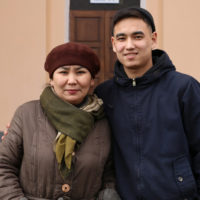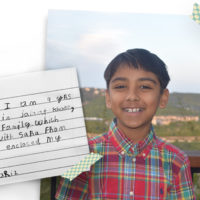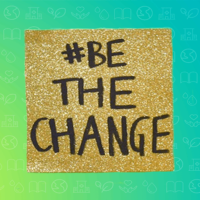In Atlanta, Georgia the leaders at Circle K Atlanta, a group of convenience stores in the Circle K franchise, have been supporters of the Aga Khan Foundation for years. Four of the leadership team and staff there recently stepped up their involvement with the Foundation. They have individually been donors for years, but this year, their company became a donor and they formed a company Walk team, reaching out to engage others to participate in the Aga Khan Foundation Walk Atlanta. In 2016 their team raised a stunning $144,717 for the Foundation’s programs in Asia and Africa.
Here they tell about that experience and what motivates them to give back to the Aga Khan Foundation.
We spoke with Amin Chitalwala, CEO of Circle K Atlanta; Shams Nanji, CFO; Salima Nanji, team lead; and Maira Chitalwala, team member.
Q: How did your team for supporting Aga Khan Foundation Walk get started? What inspired you to create the Circle K team?
Salima Nanji: It was a motivation that all four of us shared: we wanted to raise awareness of the Foundation’s work in and outside our community, and explain to our next generation, so they can continue it in the future.
Amin Chitalwala: Salima wanted to create a team a couple of years ago but Shams, Maira and I weren’t quite ready. Last year Salima took the initiative. She got in touch with Foundation’s volunteer team in Atlanta and the staff in DC and then I got involved a bit.
Shams Nanji and Maira, my wife, helped get the team going. We got on the same page. Then when we spoke with other people, we’d raise the topic of the Foundation and the annual Walk/Run event in Atlanta. The team in Atlanta does an excellent job setting up the Walk/Run event and that gave us motivation too. We have a few runners that we knew who wanted to create a team, so we got that together.
Shams Nanji: I have worked with Amin here since 1994.
Maira Chitalwala: I’m a backup for Amin and Shams when they need it.
Salima: It was kind of a joint venture for all four of us. We had such enormous runners’ participation, such great donors. It was kind of overwhelming. We got support from Jennifer Graham in the Foundation’s Washington, DC office to guide us – how to upload to the website, how to handle the donors’ checks that we were getting, and putting out emails. We had contacts from Shams and Amin – their vendors, everyone they knew in their contact list – and we emailed them. We explained why we were doing this, what the Foundation stands for, what it’s doing for developing countries, working with communities there for their priorities – food, water, education.
So we put out letters to more than 100 contacts. That’s how we started. Then locally we targeted our friends and family to join our team too.
Q: What example do you tell people to get them interested in the Foundation?
Salima: The Foundation’s work in education and literacy. That’s our main point – literacy. We got support and stories from the volunteer team in Atlanta and from the Washington office. Hopefully this year we’ll take it even further.
Q: Did you get a good response to your email contacts?
Salima: Yes, and every time the guys had a meeting in the office we’d make sure they got some material about the Foundation. So people became aware in different ways. Just talking with people outside our usual contacts.
Q: When did you first encounter the Aga Khan Development Network yourselves?
Salima: That goes back as far as I can remember. As members of the Ismaili community, we’ve been volunteers and donors since we were kids. We were always aware from our parents what the Foundation is about and what it does for communities.
Amin: My first memory of the Network goes back to my childhood too. I’m from Hyderabad, Pakistan. I was born there in an Aga Khan maternity home, built on the outskirts of Hyderabad by the AKDN. I’ve seen many developments since then. When I visited East Africa in 2007, I took my brother to the Aga Khan dispensary when he got sick. We have many impressions of how the Foundation helps people in many different ways.
Shams: I had a great experience with it too. I was born in Pakistan too. In Karimabad, the Aga Khan nursery was across from our apartment. Until age 12 I regularly visited there. Until 8th grade I was in an Aga Khan school. We benefited from the generosity of the Aga Khan in those institutions and now it’s time to give back.
Q: When you consider the impact of the $144,717 that you raised for the communities where the Foundation works, what comes to mind?
Amin: It gets multiplied many times by what others’ matching donations. It is really life-changing for many, many people. The great work of AKF will continue for hundreds of years.
This post is part of the #humansoftheworld series on our blog—a collection of tales we can both relate to and marvel at. Here, we share stories of appreciation, self-reliance, and strength from across the Aga Khan Development Network.


